
The kitchen is the heart of the home, and selecting the right worktops and splashbacks is key to achieving a balance of style, practicality, and durability. With a wide range of materials available, this guide breaks down the pros and cons to help you choose options that complement your lifestyle and aesthetic preferences.
WORKTOPS
Choosing the right kitchen worktop is a crucial decision that blends both form and function, however with so many options available it can be overwhelming to determine which option best suits your needs. Your worktop serves as the centerpiece of your kitchen, influencing everything from the aesthetic to the practicality of daily tasks. This comparison highlights the key features, along with pros and cons of popular materials like granite, quartz and wood, to help you make an informed decision to suit your needs and aesthetic preferences.
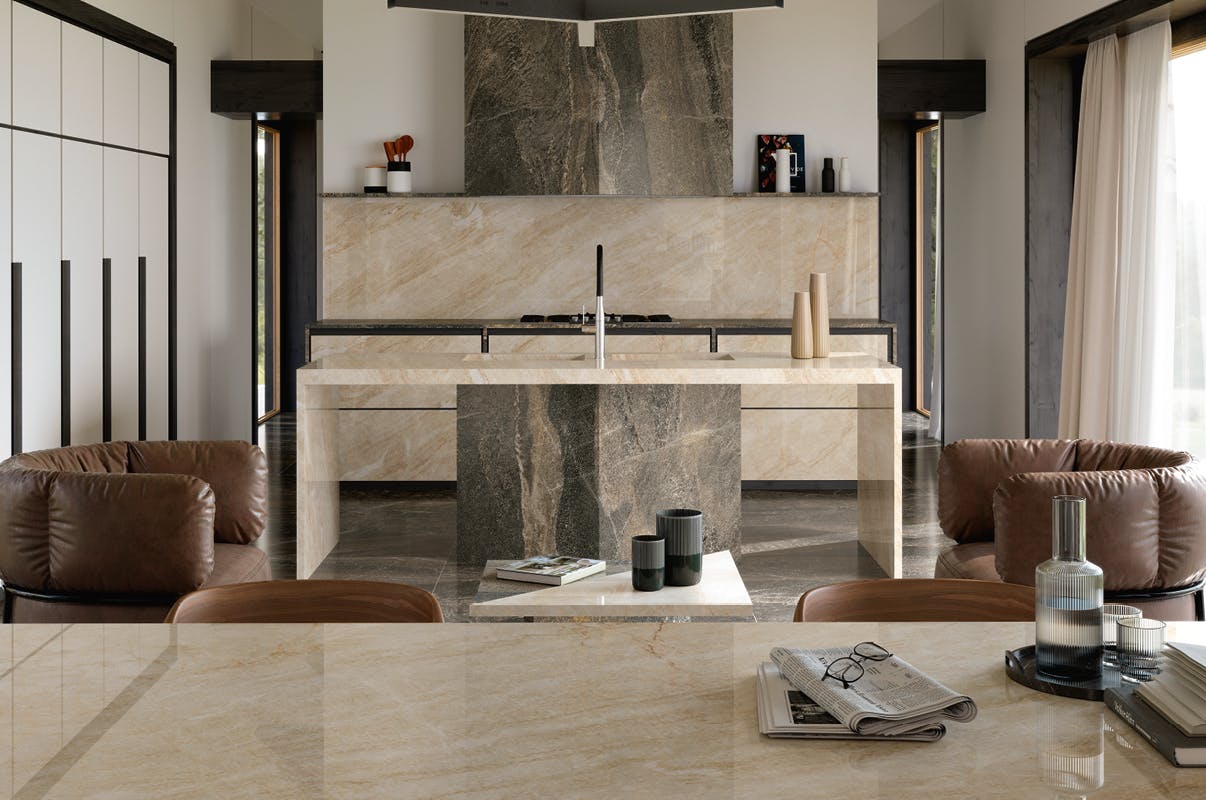
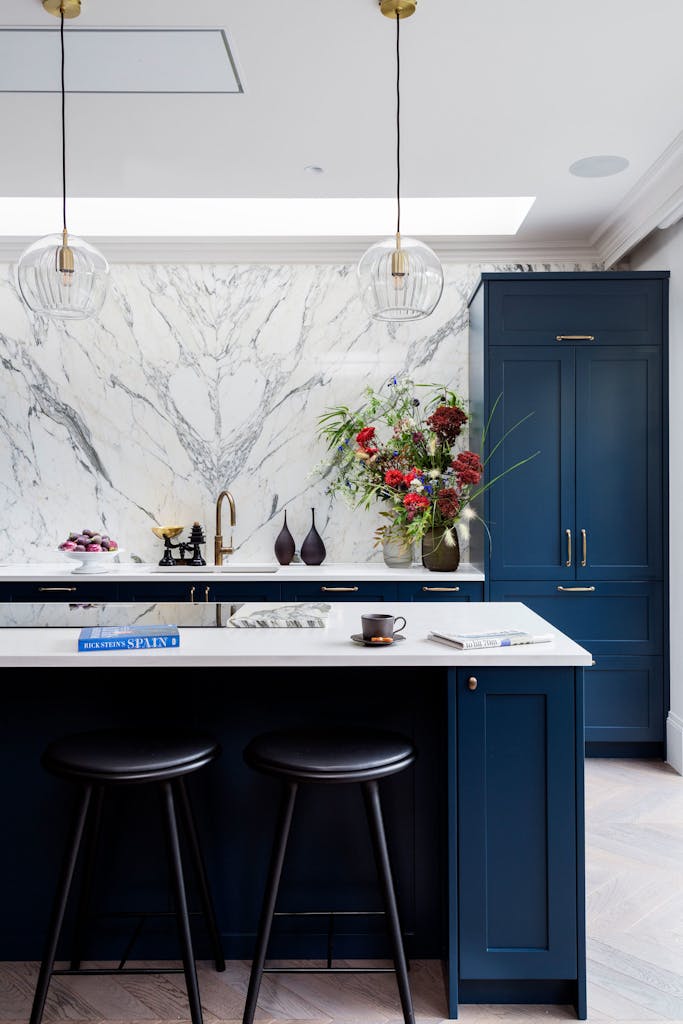
Material Options:
- Granite:
Pros: Real stone, Unique, Durable, heat and mould-resistant.
Cons: Porous and heavy. Requires sealing
- Marble:
Pros: Real stone, Marble has unique veining that adds character to any kitchen and can disguise staining.
Cons: Requires sealing and polishing, harder to repair, and often more expensive.
- Lava Stone:
Pros: Real stone, Offers superior durability, heat resistance and is low maintenance. Available in a wide range of colours and finishes to suit any design.
Cons: Can be more expensive than other materials. Porous and requires sealing to protect against stains and spills.

- Quartzite:
Pros: Real stone, durable, similar to marble but more resilient and easier to maintain.
Cons: Porous and requires regular sealing. Heavy and therefore tricky to install. Can be scratched by sharp objects.
- Quartz Resin (Caesarstone, Silestone)
Pros: Uniform, engineered option, known for its durability, low maintenance, and wide range of colours and designs. Easy to repair, non-porous, and heat-resistant, with mid-high pricing.
Cons: Exposure to high heat may cause discoloration and permanent damage. Heavy and tricky to install.
- Composite Quartz (Caesarstone)
Pros: Low-maintenance, durable, and stain-resistant.
Cons: Not heat-proof.
- Quartz:
Pros: Strong, low maintenance, non porous and requires no sealing. Uniform design. Stain-resistant due to added resins. Hygienic, as it is non-porous and resists bacteria.
Cons: Very hot objects can burn and stain.
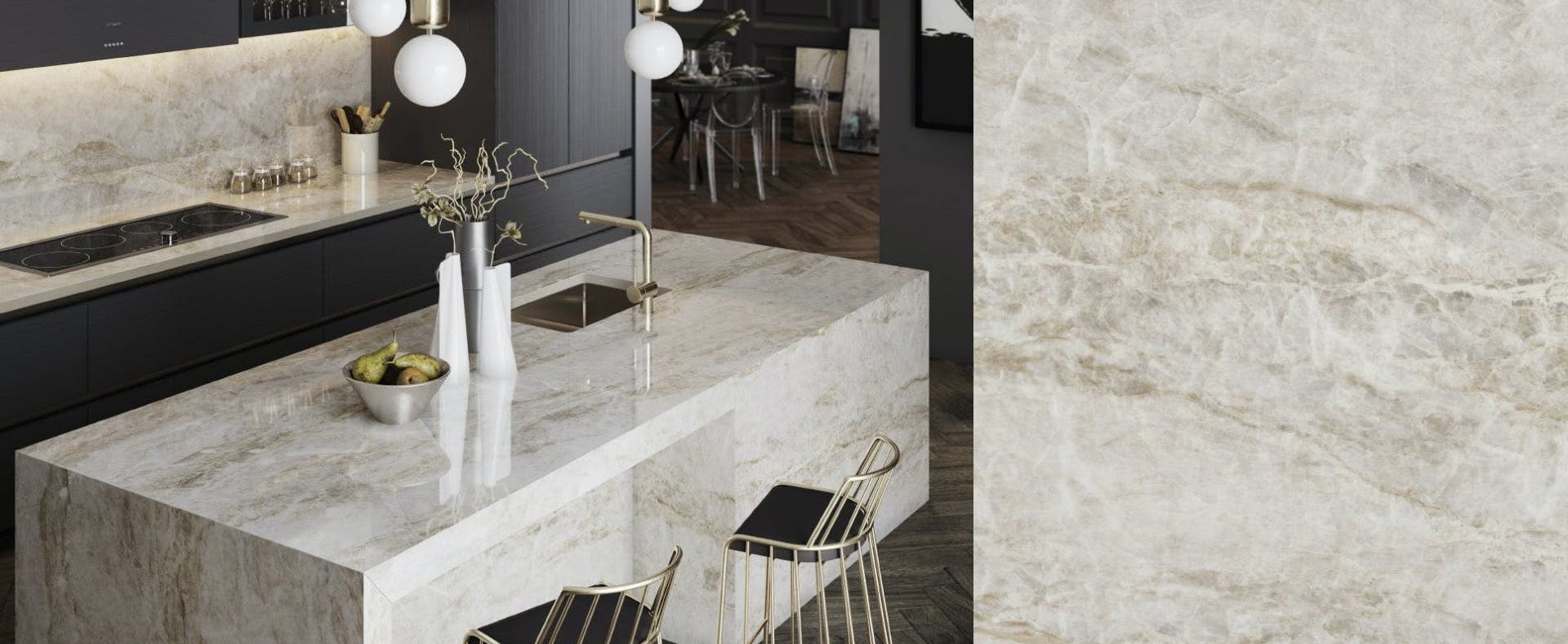
- Sintered Stone / Porcelain (Dekton, Neolith)
Pros: Extremely durable, non-porous, and heat-resistant.
Cons: More expensive and harder to work with, harder to repair
- Corian:
Pros: Smooth, hygienic, and versatile.
Cons: Can scratch and discolour.
- Concrete:
Pros: Textured and versatile with an industrial look.
Cons: Stains easily and needs sealing.
- Stainless Steel:
Pros: Modern, durable and easy to clean.
Cons: Shows fingerprints and scratches.
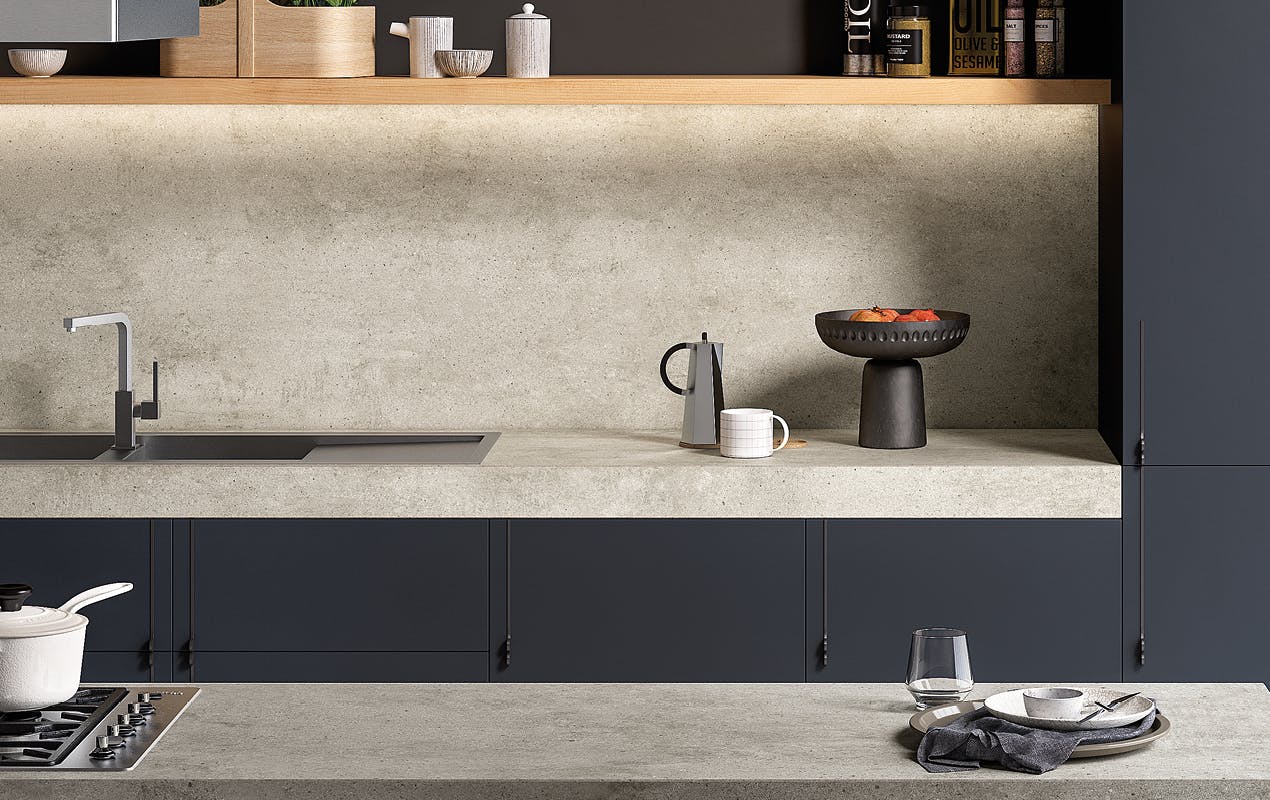

- Copper:
Pros: Beautiful, unique, naturally antibacterial, easy to clean
Cons: Soft and prone to denting.
- Wood:
Pros: Warm, easy to repair
Cons: Prone to scratches and water damage. Requires regular oiling.
- Reclaimed options:
Pros: Offer a more sustainable solution. Can add a well worn characterful aesthetic.
Cons: Having precise measurements is key to ensure you accommodate aspects like sinks, taps and drainage.
- High quality laminate:
Pros: Low-cost with bold colour options
Cons: Can lack durability and therefore requires replacing more frequently
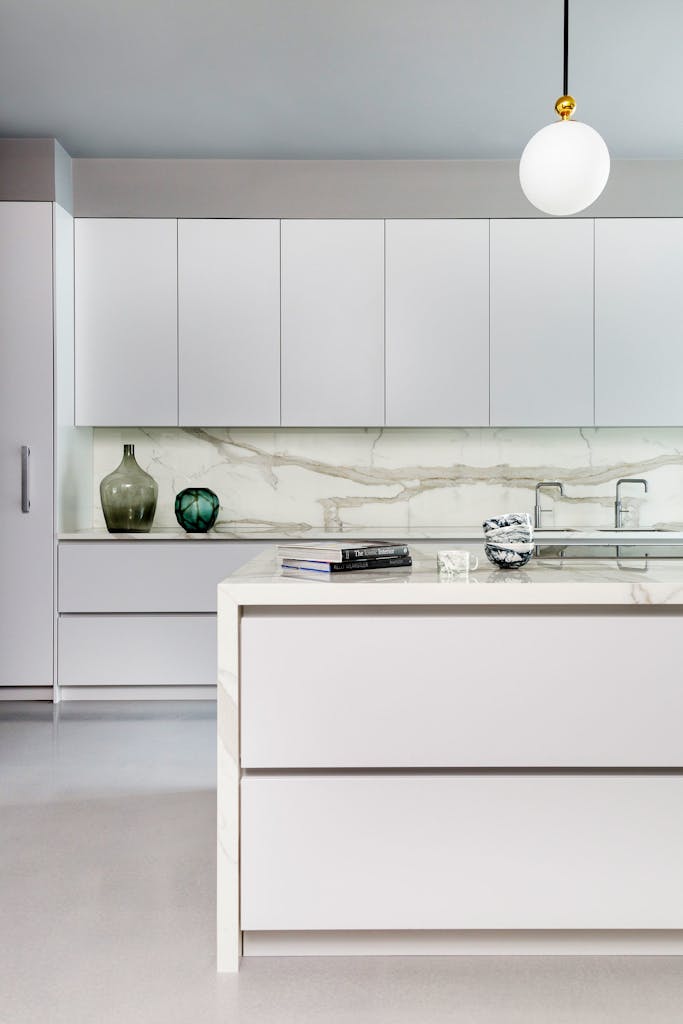
SPLASHBACKS
Splashbacks are a key design element in the kitchen, offering both style and functionality. They protect walls from splashes while enhancing the overall aesthetic of the space. From sleek glass to luxurious natural stone, the material you choose can set the tone for your kitchen’s look and feel. Matching worktops & splashbacks provide a sleek, cohesive look, whilst contrasting tiles or materials can give a striking point of difference.

Material Options:
- Natural Stone:
Pros: Luxurious.
Cons: Requires sealing and maintenance
- Tiles:
Pros: Available in many designs including textured, patterned & mosaic. Variety of colours and textures. Can help to add a design element.
Cons: Regular grout maintenance required
- Terrazzo;
Pros: Unique, durable, heat resistant and easy to clean.
Cons: Porous and requires sealing. High maintenance. Can crack if not installed correctly and can be difficult and expensive to repair.
- Stainless Steel:
Pros: Durable, easy to clean, and edgy.
Cons: Shows marks, scratches and dents easily.
- Copper:
Pros: Reflective and eye-catching. Improves with age.
Cons: Requires regular maintenance.
- Polished Plaster
Pros: Rugged and durable and seamless.
Cons: Naturally porous and not waterproof.
- Mirrored Toughened Glass:
Pros: Expands small spaces and brightens kitchens. Durable and heat resistant and seamless.
Cons: Needs to be measured precisely.
- Glass:
Pros: Sleek, versatile and easy to clean and seamless.
Cons: Less durable and requires regular cleaning.

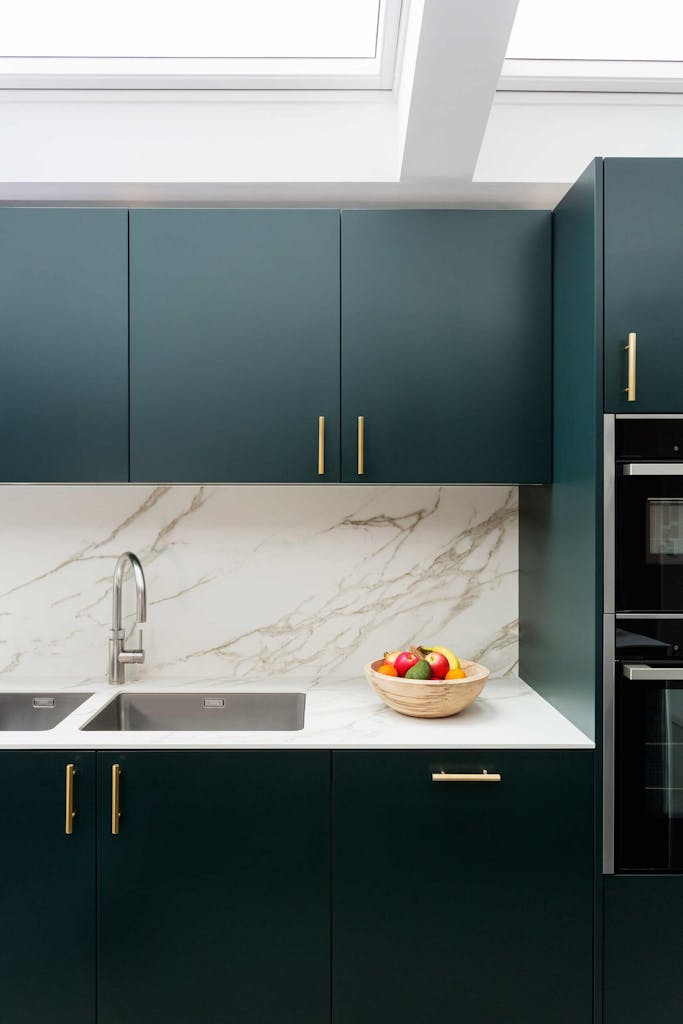
Final tips for choosing worktops and splashbacks:
When selecting a worktop and splashback, consider your lifestyle, kitchen use, and maintenance preferences. Will it be subject to heavy use? Do you prefer a low-maintenance option? Do you want a seamless aesthetic? Is it age appropriate for the house and architecture? Each material has its advantages, so choose based on durability, aesthetics, and upkeep requirements.
Explore our work and see how we can help reimagine your home with bespoke design services.




